
The Brady Bunch is an American sitcom created by Sherwood Schwartz that aired from September 26, 1969, to March 8, 1974, on ABC. The series revolves around a large blended family of six children, with three boys and three girls. After its cancellation in 1974, the series debuted in syndication in September 1975. Though it was never a ratings hit or a critical success during its original run, the program has since become a popular syndicated staple, especially among children and teenage viewers.

Anna Marie "Patty" Duke was an American actress. Over the course of her acting career, she was the recipient of an Academy Award, two Golden Globe Awards, three Primetime Emmy Awards, and a star on the Hollywood Walk of Fame.

High Voltage (1929) is an American pre-Code film produced by Pathé Exchange and directed by Howard Higgin. The film stars William Boyd, Diane Ellis, Owen Moore, Phillips Smalley, Billy Bevan, and Carole Lombard in her feature-length "talkie" debut, billed as "Carol Lombard."

The Patty Duke Show is an American television sitcom created by Sidney Sheldon and William Asher. The series ran on ABC from September 18, 1963, to April 27, 1966.
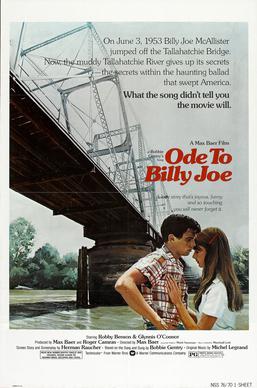
Ode to Billy Joe is a 1976 American drama film, directed and produced by Max Baer Jr., with a screenplay by Herman Raucher, and starring Robby Benson and Glynnis O'Connor. It is inspired by the 1967 hit song by Bobbie Gentry, titled "Ode to Billie Joe."

Outrageous! is a 1977 Canadian comedy-drama film written and directed by Richard Benner. The film stars Craig Russell as female impersonator Robin Turner, and Hollis McLaren as Turner's schizophrenic roommate Liza Conners. The plot begins in Toronto, with later scenes in New York City.

The Bradys is an American comedy-drama television series that aired on CBS from February 9 to March 9, 1990. The series is a sequel and continuation of the original 1969–1974 sitcom The Brady Bunch, focusing on its main characters as adults, and was the second such continuation after the 1981 sitcom The Brady Brides.

Harlow is a 1965 American biographical drama film directed by Gordon Douglas about the life of film star Jean Harlow. It stars Carroll Baker in the title role and Raf Vallone, Red Buttons, Angela Lansbury, Peter Lawford, Mike Connors, Martin Balsam and Leslie Nielsen in supporting roles. Although the film failed commercially, it was successful in launching the hit song "Girl Talk" by Neal Hefti.

Carol Jackson is a fictional character from the BBC soap opera EastEnders, played by Lindsey Coulson. The character was introduced in 1993 as the mother of the Jackson family. Coulson decided to quit the role in 1997, but she returned temporarily in 1999 within a storyline that contributed to both the introduction of her boyfriend Dan Sullivan and the departure of her daughter Bianca ; in the storyline, Carol discovers that Bianca had previously had a relationship with Dan and they resumed their affair – which prompted her to end her relationship with Dan, disown Bianca, and leave the square on her own.

"Forever Charmed" is the last episode of the American supernatural-drama television series Charmed, and the 178th overall. It is the second part of the double-episode series finale of the show's eighth season. The episode was written by Brad Kern and directed by James L. Conway. It was originally broadcast in the United States on May 21, 2006 on The WB. "Forever Charmed" involves time travel, nostalgic family visitations and a reprise of various important historical background situations, as well as a glimpse of the future to other progeny of The Charmed Ones. It was watched by 4.5 million American viewers, becoming the highest-rated episode of the season.

Payment on Demand is a 1951 American drama film directed by Curtis Bernhardt and starring Bette Davis and Barry Sullivan. The screenplay by Bernhardt and Bruce Manning chronicles a marriage from its idealistic early days to its dissolution.

Laughter in Paradise is a 1951 British comedy film directed by Mario Zampi, starring Alastair Sim, Fay Compton, George Cole, and Guy Middleton. The film was remade as Some Will, Some Won't in 1970.
The Branning family, together with the Jackson family are a fictional extended family in the BBC soap opera EastEnders. Introduced in 1993 were the Jackson family, consisting of Carol Jackson, her partner and later husband Alan Jackson, and Carol's four children, Bianca Jackson, Sonia Jackson, Robbie Jackson, and Billie Jackson ; he is the only child fathered by Alan. The family becomes a more dominating presence in 1999, when Carol's father Jim Branning moves to Walford following the death of his wife Reenie due to cancer. Since then, all six of Jim's children have appeared, many of them with their own families.
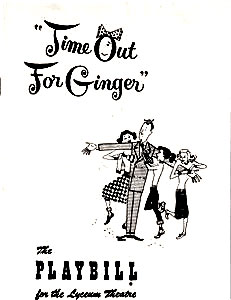
Time Out for Ginger is a Broadway comedy written by Ronald Alexander, and directed by Shepard Traube (1907–1983), that ran 248 performances at the Lyceum Theatre from November 26, 1952, to June 27, 1953, before becoming hugely popular in regional theatres throughout the 1950s and early 1960s.

Black Girl is an American family drama film with a screenplay by J.E. Franklin, based on her 1969 play, and directed by Ossie Davis. The film explores issues and experiences of black womanhood in the 1970s, including how black women were depicted and common stereotypes of the period. According to Melvin Donalson in Black Directors in Hollywood, "Black Girl is a film that explores the intricate and sometimes painful connections between mothers and daughters."
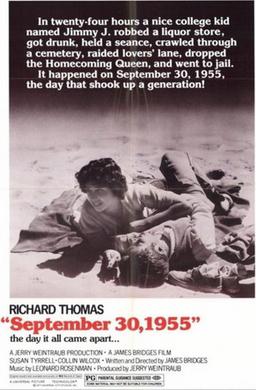
September 30, 1955 is a 1977 drama film written and directed by James Bridges and starring Richard Thomas.
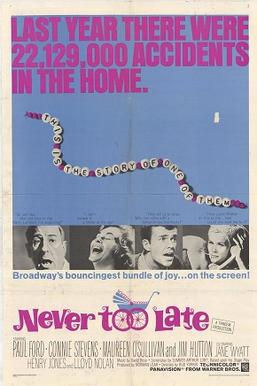
Never Too Late is a 1965 comedic feature film directed by Bud Yorkin and produced by Norman Lear. It stars 54-year-old Maureen O'Sullivan as the wife of a businessman who discovers, after 25 years of marriage, that she is to become a mother for the second time. Adding to the complications is the fact that their married daughter and her husband live with them.
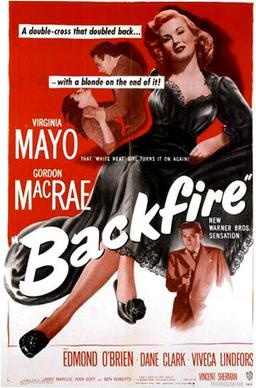
Backfire is a 1950 American film noir crime film directed by Vincent Sherman starring Virginia Mayo and Gordon MacRae, with Edmond O'Brien, Dane Clark, and Viveca Lindfors in support.

















